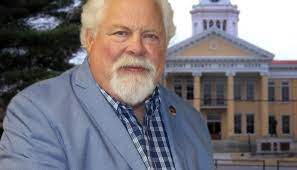Trouble in Paradise? (Part 12)
In Blount County, the 21-member County Commission often resembles the inept Keystone Kops.
County Mayor Ed Mitchell always seems to get what he wants—a taxpayer-subsidized Amazon warehouse in Alcoa he risibly described as a “Super Bowl win” for the community, for example—not because he is a Machiavellian strategist or a cunning statesman, but because the legislative body that is supposed to serve as a check on the executive (the Blount County Commission) often resembles the Keystone Kops.

Last night’s Commission meeting was an example. Last month the Commission rejected the Mayor’s slate of nominees for the powerful Budget Committee, which included liberal Democratic activist Sharon Hannum. Instead of proposing a new slate, or altering the proposed nominees in any way, Mitchell merely re-submitted them, as is. A legislative body with an ounce of self-respect would have treated this move as the insult it was, and rejected the nominees again. Last night, however, the Commission voted to approve each nominee one at a time—the same proposed Budget Committee it rejected a month earlier.
Even worse, the same day that the Daily Times reported that Mitchell had failed to consult with the city managers of Alcoa and Maryville before proposing a $20 million infrastructure package that would (among other things) expand the reach of the local sewer system, the County Commission voted to approve the package by a 15-4 vote, with only Nick Bright, James Hammontree, Tom Hood, and Jeff Jopling voting no. Jopling made a heroic effort to postpone the vote until the Ad Hoc Land Use Committee had a chance to evaluate the potential repercussions to the community, but his motion failed by an 11-8 margin.

At last night’s meeting, Commissioners who played an especially ignominious role, carrying the Mayor’s water, were Mike Akard, Tom Stinnett, and Rick Carver. Connecting Louisville and Friendsville (both currently served by septic only) to the existing sewer system will promote increased development as surely as squirting lighter fluid on a fire. Some property owners in Louisville and Friendsville will be enriched when currently undeveloped (and undevelopable) property is turned into industrial parks, strip malls, subdivisions, and even apartments. Someday, when we wonder how Louisville morphed into a knockoff of Concord/Farragut, and Friendsville merged with Lenoir City, we can trace the blame to last night’s fateful vote.
I was disappointed that no one challenged Louisville Mayor Tom Bickers’ claim that his city has experienced dramatic population growth in recent years by pointing out that the bulk of that growth was due to aggressive annexation. Louisville has annexed every square inch of its Urban Growth Boundary, possibly in anticipation of future development. Likewise, when Bickers complained that it was “unfair” for Maryville residents to seek to “deny” sewer service to Louisville, no one pointed out that Alcoa and Maryville have sewer pipelines because their residents paid for them with bond proceeds financed by property taxes. Louisville is currently sewer-less because residents have chosen to avoid property taxes as a home rule charter city. If some septic tanks in Louisville are leaking—and there was a good deal of unsupported conjecture being thrown around last night—that should be the city’s, or individual property owners’, responsibility to correct.

The Daily Times reports on the meeting here. My remarks, which were limited to three minutes, are briefly quoted. The full text is set forth below.
My name is Mark Pulliam, and I live in District 5. My comments concern the agenda item described as Resolution No. 22-02-001—the $20 million infrastructure project. I’m not opposed to infrastructure improvements per se. Our local roads, parks, schools, and public spaces could all benefit from sharing in the proceeds from a $20 million ARPA/TDEC windfall. It is even possible that some or all or the proposed county-wide “utility projects” in this resolution are a prudent investment in the community’s future, but details regarding this massive public works proposal are lacking. The potential consequences of extending the reach of the existing sewer system need to be addressed. It would be reckless to approve this resolution without a full airing of the future changes it may enable.
Last year, the proposed residential development at Pate Farms elicited a tremendous outpouring of bipartisan grassroots opposition at the Blount County Planning Commission, which unanimously denied the plans for a high-density subdivision, in part because of concerns about the availability of sewer at the Pate Farms property. https://www.thedailytimes.com/news/blount-county-planning-commission-votes-down-proposals-for-two-major-subdivisions/article_4760e4b2-bba0-575a-a5f0-f9442b31cc30.html
What we learned from the Pate Farms controversy is that, regardless of soil characteristics, property served by septic is limited to a much lower density than property served by sewer, by a ratio of 4 or 5 to 1 (1.2 units per acre vs. 5 or more units per acre). Areas with poor soil characteristics face even lower density limits with septic. The city of Louisville is currently not connected to the Maryville sewer system. This has historically limited development in Louisville, both residential and commercial.
Installing sewer lines is expensive, and Louisville has avoided paying for such improvements because, as a home rule charter city, Louisville does not levy a property tax and has limited sources of revenue with which to finance capital projects. The reason that Louisville doesn’t look like Concord or Farragut on the Knox County side of the river is the lack of sewer in Louisville. Septic has also kept property values lower in Louisville. Louisville residents have chosen to save on property taxes in lieu of retaining the ability to finance large capital projects. (I wonder if the utility project in the proposed resolution will also tend to accelerate development in Townsend. We do not want Townsend to become Gatlinburg.)
The county’s expenditure of almost $3 million to connect Louisville to the existing sewer system—a cost that Louisville residents should properly bear—will dramatically alter the development potential (and increase the property values) of land in Louisville. Apartments, shopping centers, and massive subdivisions would become possible with sewer. Some landowners will be enriched. Blount County residents are entitled to an unbiased projection of how this will alter the character of their community. If the extension of sewer lines dramatically increases residential development, who will pay for the roads to be widened, schools and fire houses to be built, and new parks? Not Louisville residents through property taxes, but the county.
Spending “free” ARPA/TDEC money today could cost Blount County taxpayers dearly in the future.
Some of the reasons being offered is support of extending sewer to Louisville strike me as pretextual. If current septic tanks in Louisville and Friendsville are leaking or failing, that is a problem individual property owners should be responsible for correcting. The “Water and Utility Presentation” states that the population of Louisville has “almost doubled” in the past 10 years, without noting that most of that growth has been through annexation. Louisville has annexed every inch of its Urban Growth Boundary—a choice that the city freely made, which the county is not obligated to remedy.
This resolution could have momentous consequences. The public deserves a careful analysis of the implications before the Commission approves it. I implore you not to “rush to judgment.”
Addendum: Fortunately, we have County Commission elections this year. Let’s replace the Keystone Kops with commissioners who will stand up to the Mayor and represent the interests of ordinary citizens, not just the developers and cronies.































